Sunset in Batavia, Illinois
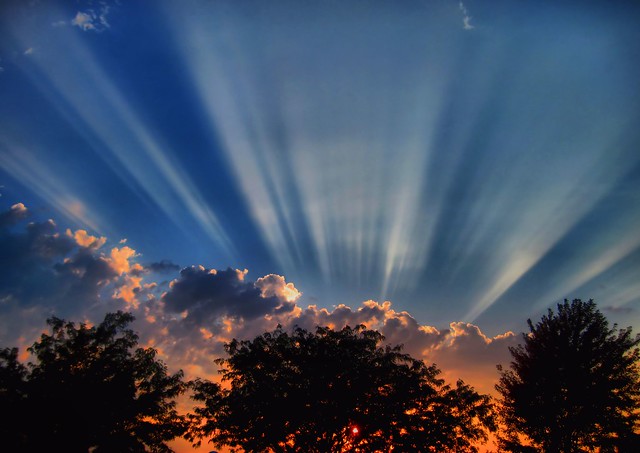
Linking to Skywatch Friday
This photo of a White-crowned Sparrow was taken in our daughter's back yard in Batavia, Illinois on May 5 last year.

Sharing this photo on GOOD FENCES by Tex (Theresa):
http://run-a-roundranch.blogspot.com
The final (seventh) day of our Alaska Cruise started with a visit to Hubbard Glacier. We witnessed calving of chunks of ice as high as 20 story buildings. Favorable winds had cleared the icebergs from the area in front of the glacier, so our ship was able to maneuver quite closely.
Hubbard Glacier begins 76 miles away in Canada's Yukon and meets the sea in Disenchantment Bay (also known as Yakutat Bay). It is North America's largest tidewater glacier. As it breaks off into the sea it towers 60 feet tall and is 7 miles wide.
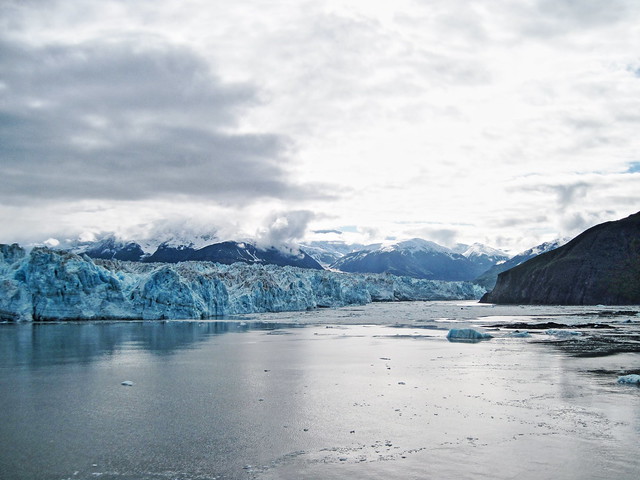
Far to the right, barely visible along the face of the glacier in the above photo, is an ice formation that looks like an animal's head with two protruding ears. We called it the "Batman" formation and it looked unstable.

The large deep blue tower just this side of Batman's "ear" suddenly came crashing down with a thunderous roar.
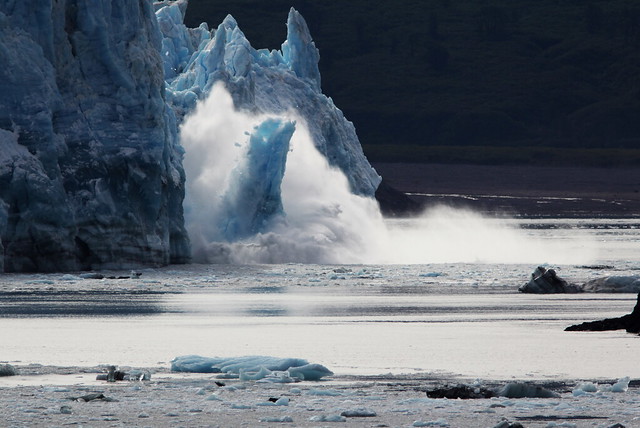
Luckily, I had captured a burst of about 12 frames as the tower fell. If you do not see the animation, click on the image to view the series as an animated GIF, or VISIT THIS LINK.
I did not expect to see many birds from our vantage point, but a mixed flock of Surf Scoters and Long-tailed Ducks appeared in front of the ship.

They burst into flight. This was the first time I had ever photographed Long-tailed Ducks. They are distinguished from the scoters by the white they show on their outer tail feathers.
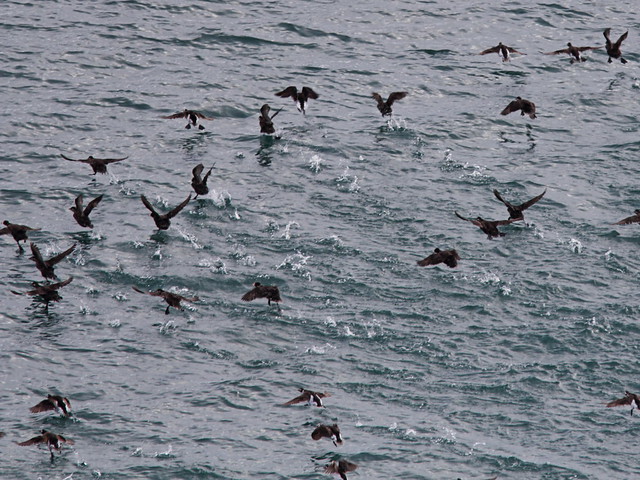
This chunk of ice shows how the glacier's deepest layers are blue, indicating that the weight of snow that accumulated over more than a hundred years have squeezed out all the air.
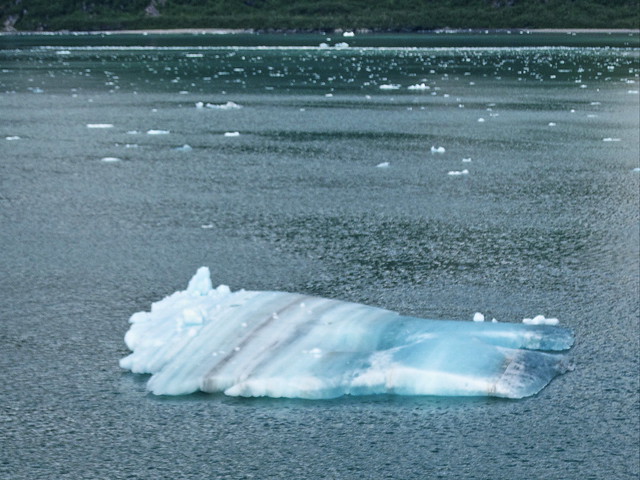
Members of the ship's crew collected chunks of blue ice to be used in carvings (...and maybe cocktails.* Glacier "worms" crawl out when they are irritated by the alcohol-- see note at end of this post).*
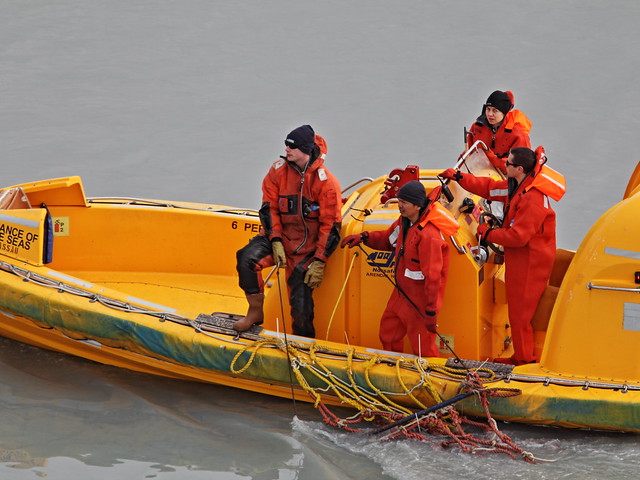
In the foreground, a Bald Eagle was roosting on an iceberg.
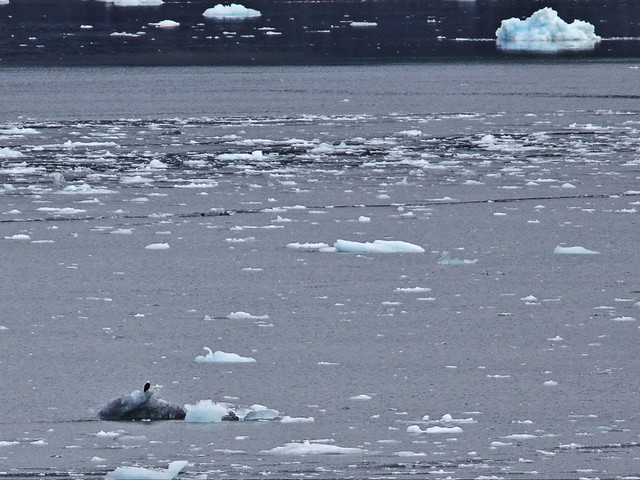
The eagle flew up. It was in sub-adult plumage, probably in its fourth year.
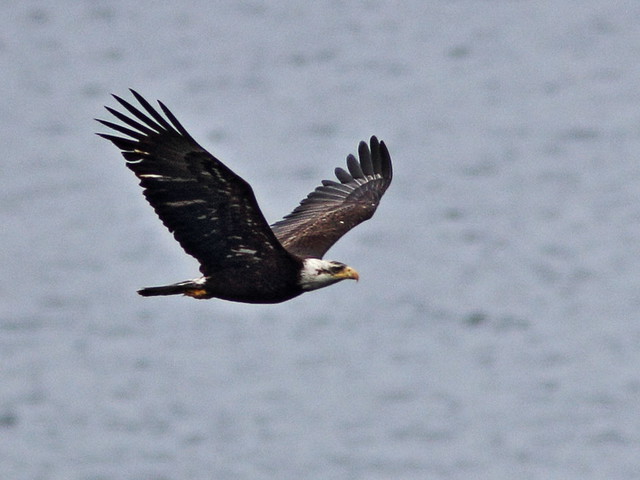
Black-legged Kittiwakes flew around the ship.
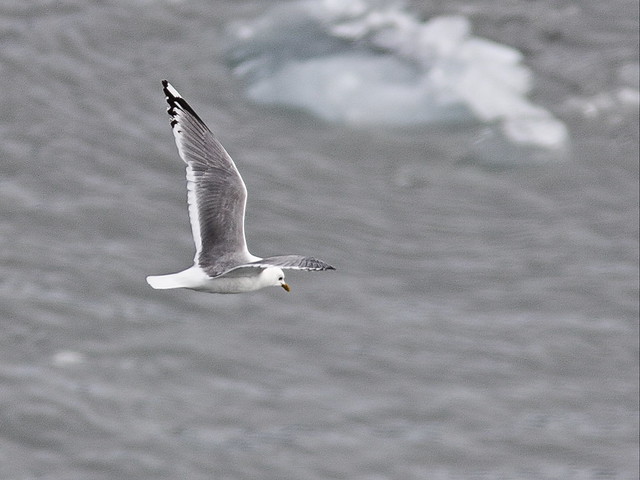
We were offered a private tour of the ship's galley.
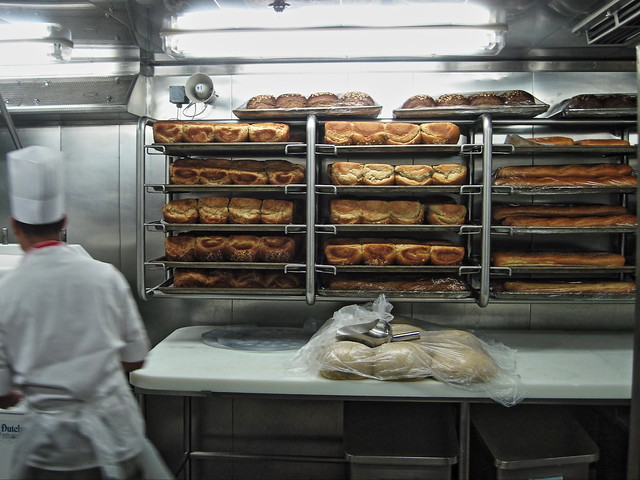
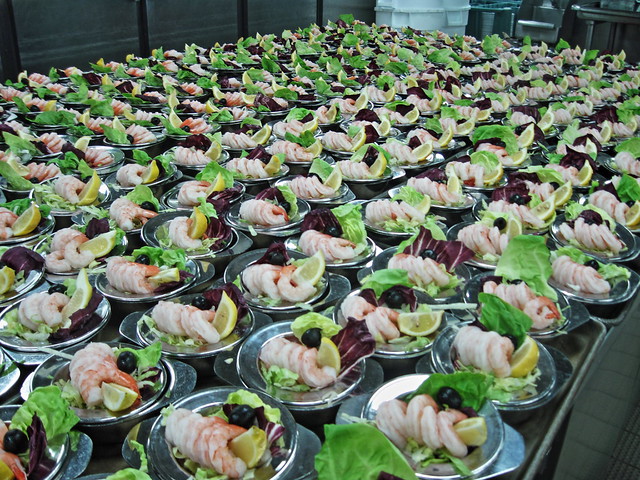
The next morning, we docked in Seward. Our ship, The Radiance of the Seas, is in the background.
Our families visited the Alaska SeaLife Center. The open aviary provided photo opportunities. Here are better views of Long-tailed Ducks:
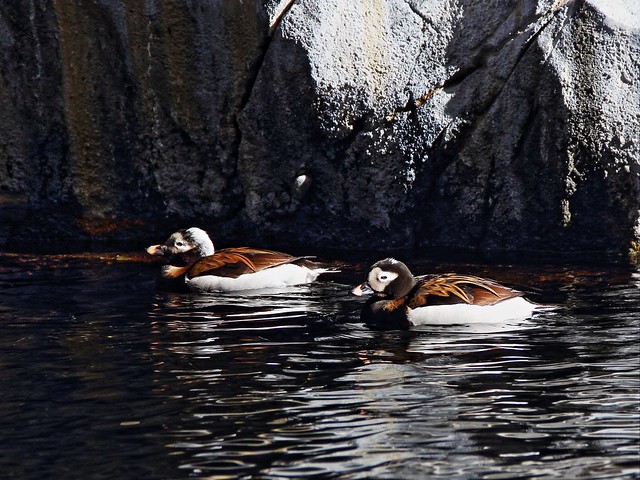
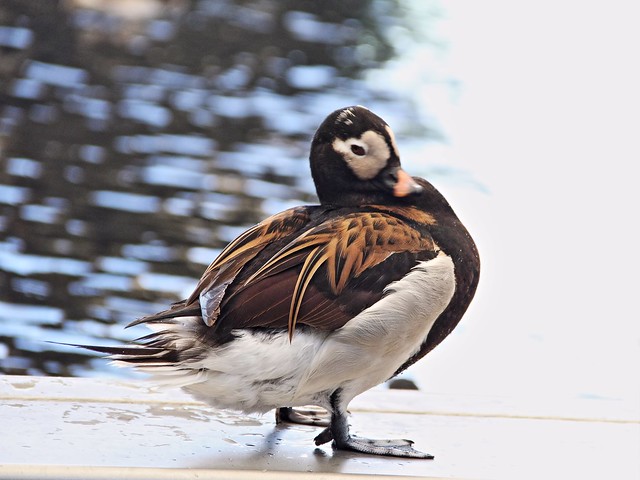
Horned Puffins:
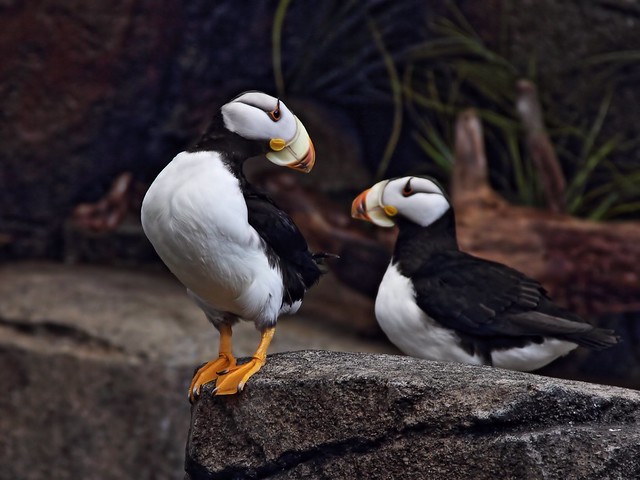
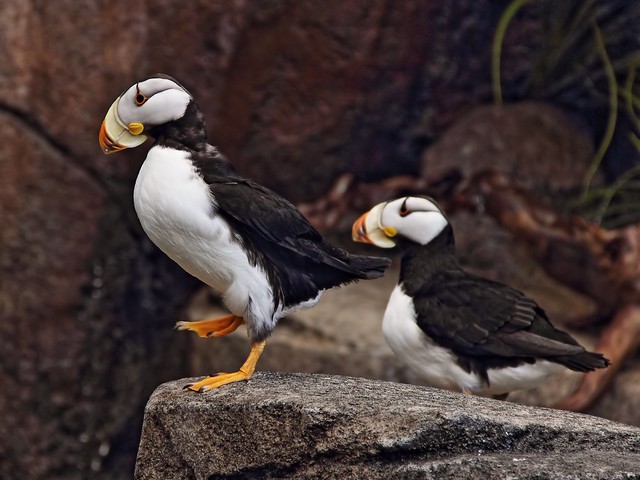
Tufted Puffins:
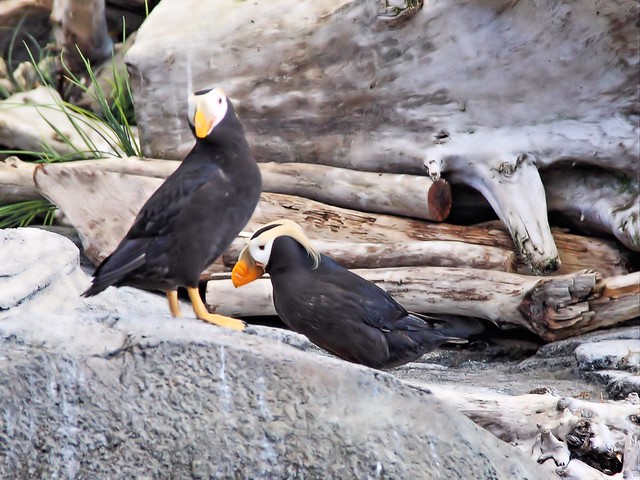
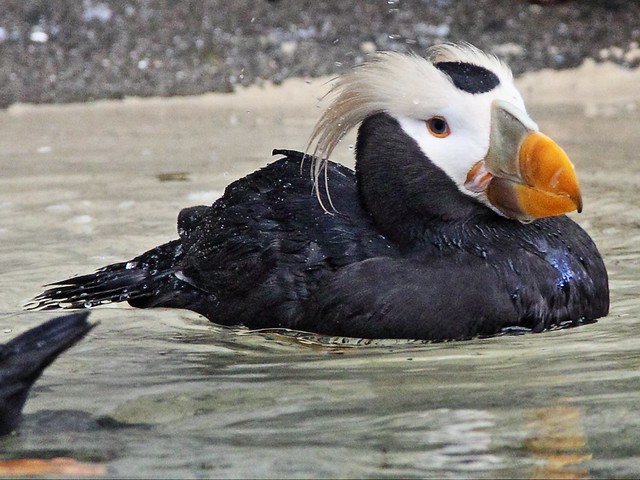
Common Murres:
A Common Murre with a pair of King Eiders:
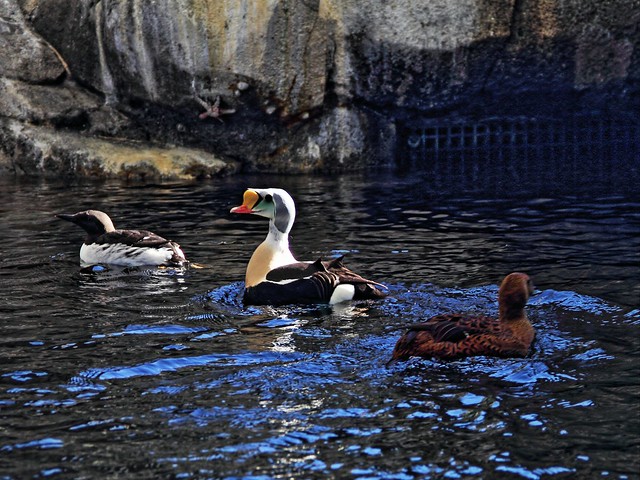
Close-up of the male eider:
Red-legged Kittiwake:
Black Oystercatcher
We proceeded up to Denali National Park on the land portion of our tour.
*More about ice worms at this link
The Ballad of the Ice Worm Cocktail
--Robert Service, 1940
(final stanzas as Major Brown finally drinks it down
to earn the right to be called a "sourdough.")
...The Major took another look, then quickly closed his eyes,
For even as he raised his glass he felt his gorge arise.
Aye, even though his sight was sealed, in fancy he could see
That grey and greasy thing that reared and sneered in mockery.
Yet round him ringed the callous crowd - and how they seemed to gloat!
It must be done . . . He swallowed hard . . . The brute was at his throat.
He choked. . . he gulped . . . Thank God! at last he'd got the horror down.
Then from the crowd went up a roar: "Hooray for Sourdough Brown!"
With shouts they raised him shoulder high, and gave a rousing cheer,
But though they praised him to the sky the Major did not hear.
Amid their demonstrative glee delight he seemed to lack;
Indeed it almost seemed that he - was "keeping something back."
A clammy sweat was on his brow, and pallid as a sheet:
"I feel I must be going now," he'd plaintively repeat.
Aye, though with drinks and smokes galore, they tempted him to stay,
With sudden bolt he gained the door, and made his get-away.
And ere next night his story was the talk of Dawson Town,
But gone and reft of glory was the wrathful Major Brown;
For that ice-worm (so they told him) of such formidable size
Was - a stick of stained spaghetti with two red ink spots for eyes.
Visit these links to view the entire series of blogs on this Alaska trip:
Cruising to Ketchikan, Alaska
Cruising to Alaska's Icy Strait and Hoonah
Visiting Juneau and Skagway
Hubbard Glacier and Seward, Alaska
Denali National Park
Riding the rails from Denali to Anchorage
Juneau has been the capital city of Alaska since 1900, when it was a US territory. Although at that time it was a thriving Gold Rush city, the population of the state now centers around Anchorage, 575 miles ( 925 kilometers) away. No roads lead to Juneau, as it is accessible only by boat or airplane and can boast of some of the rainiest weather in the US, raining 250 days and averaging over 62 inches annually. Actually it is tied for fourth place among the rainiest cities, behind Mobile, Pensacola, New Orleans, and West Palm Beach (in my own Broward County in Florida), but we have rain only 145 days a year.
As our ship pulled into a dreary Juneau harbor on the fifth day of our cruise, the city was living up to its reputation as rainiest Capital in the US.
SPOILER ALERT: Finny and furry creatures, but no bird sightings to report on this leg of our Alaskan cruise.
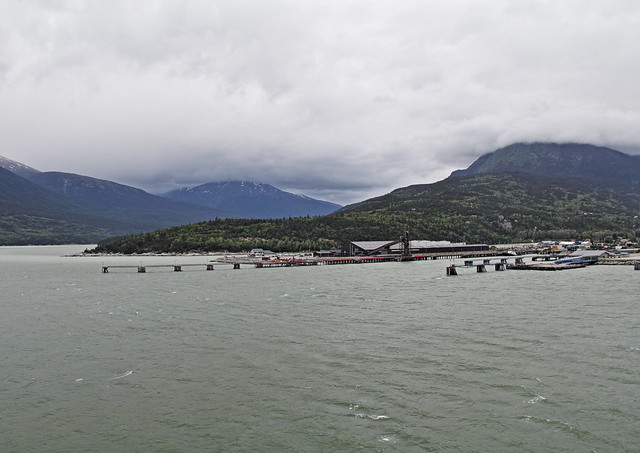
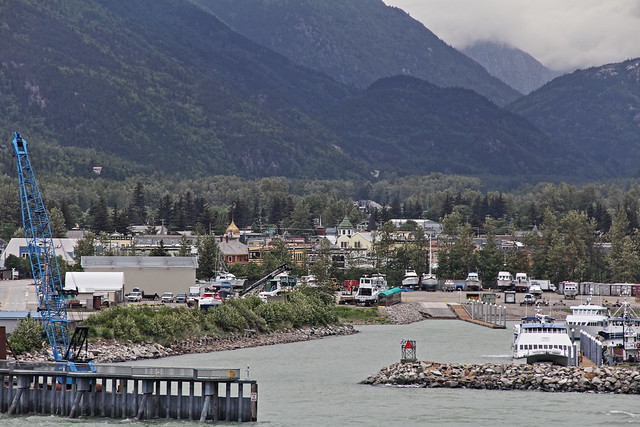
Rains had set in and did not let up, so it was a bad day for photography. We took a whale-watching cruise, then visited Mendenhall Glacier. I spent the morning protecting my camera from the rain and spray as we raced in a catamaran from one whale sighting to another.
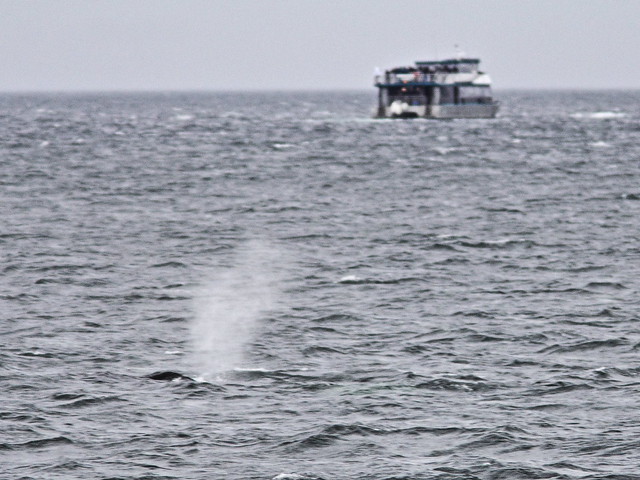
We were entertained by the frolics of a group of Steller's Sea Lions as they took turns climbing and diving on a bell buoy.
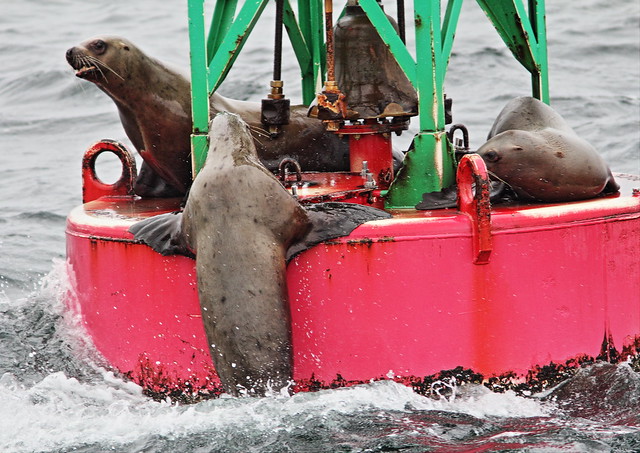
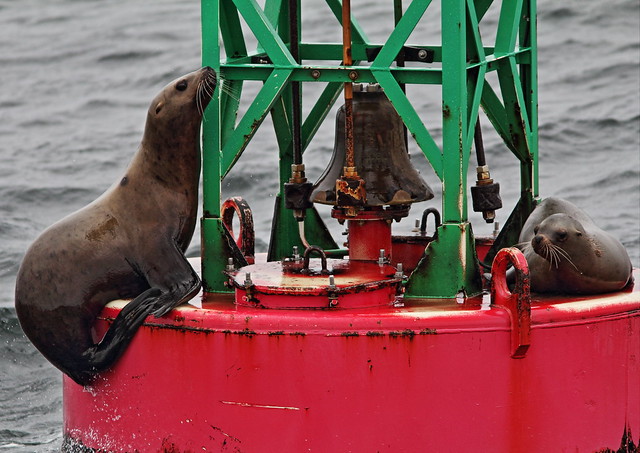
Despite the rain, our brief visit to Mendenhall Glacier was enjoyable. The glacier is only 12 miles from Juneau. Over thirteen miles (21.9 km) long, the ice is up to 1,968 feet (600 meters) thick and stands from 10 to 70 feet (3-20 meters) high at its face, moving into the sea at 223-305 feet (68-93 meters) per year.The glacier has receded almost 2 miles during the past 55 years, creating Mendenhall Lake in front of it. It replenishes itself as warm, moist air is drawn up to the glacier's point of origination, where it falls as snow to feed its ice field, but the glacier's progress does not overcome the melting effects of the warming climate.
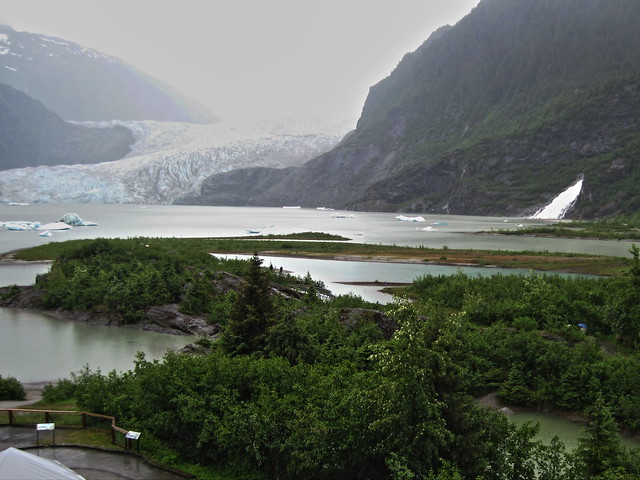 Our granddaughters enjoyed themselves despite the constant rain.
Our granddaughters enjoyed themselves despite the constant rain.
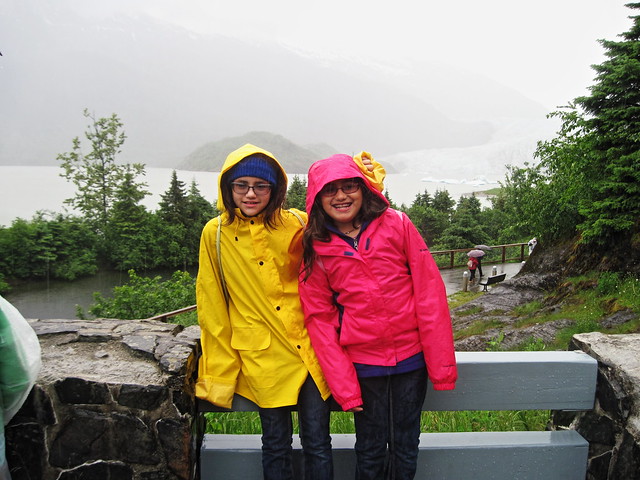
The rain continued into day #6 of our Alaskan cruise, when we took the White Pass Scenic Railway out of Skagway. We boarded at our ship's dock at sea level and climbed over 2800 feet to the summit of White Pass and beyond, 64 miles one-way, then returned via the same one-track route.
The ride was indeed scenic...

...passing over trestles high above the mountain streams...
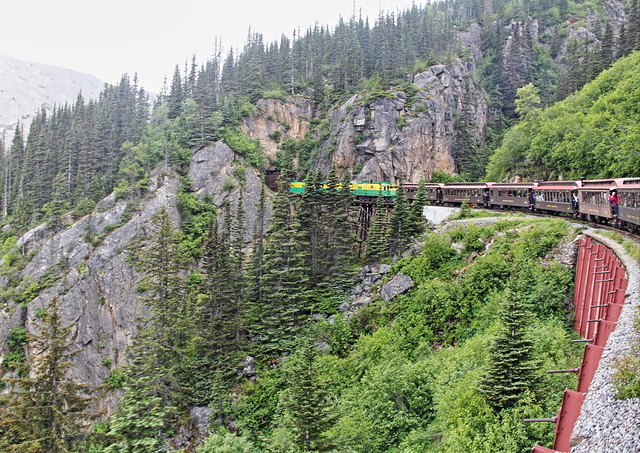
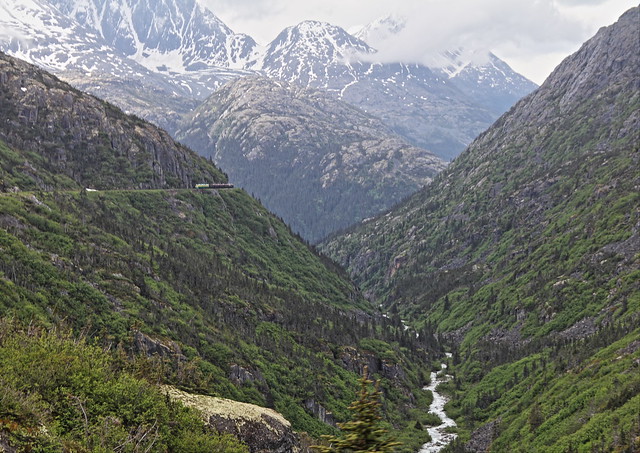
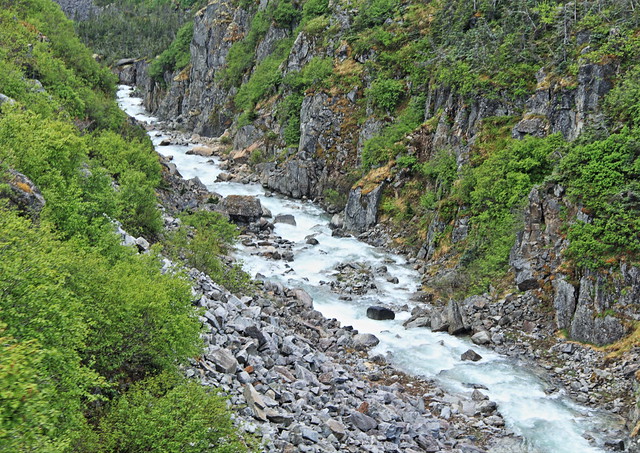
...and negotiating two tunnels.
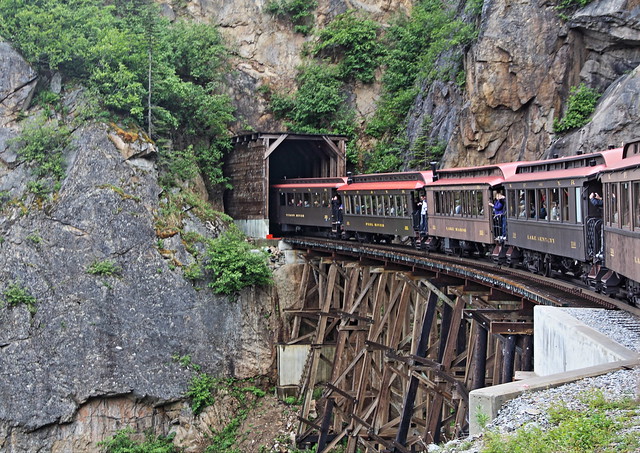
The views were breathtaking. Vegetation changed from coastal mixed woodlands to dense forests, and...
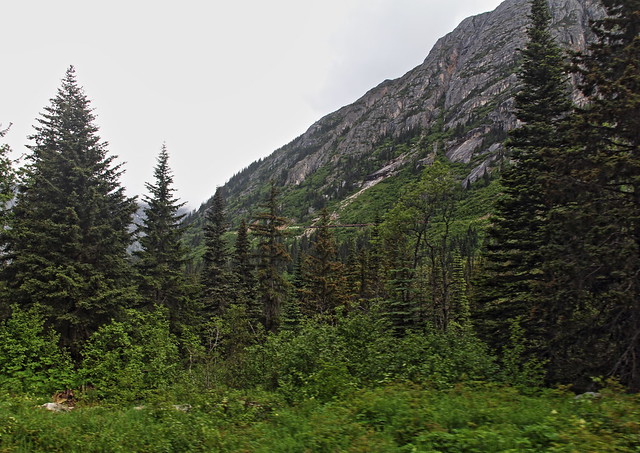
...as we crossed above the timberline, to treeline taiga, meadows and sub-alpine tundra.
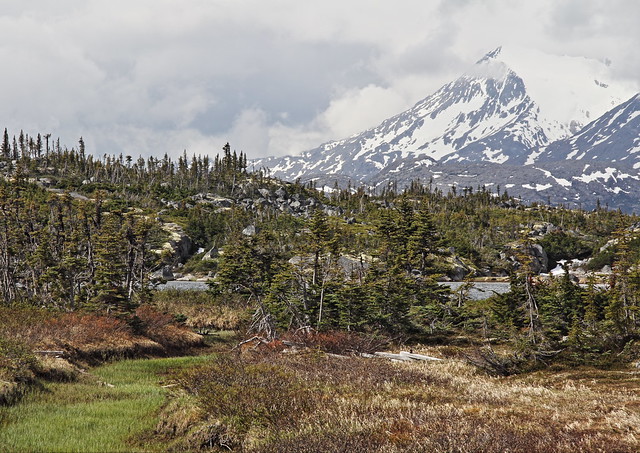
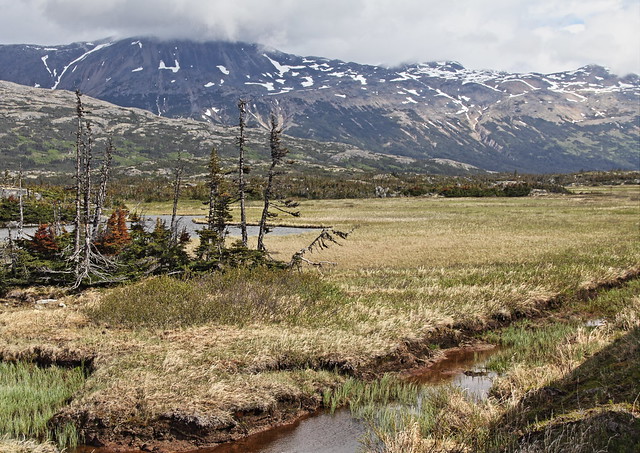
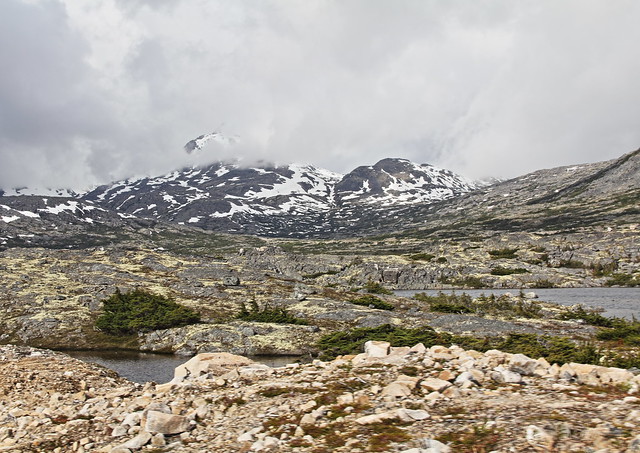
Mountain Goats browsed on distant rocky outcroppings, difficult to distinguish from the snow patches.
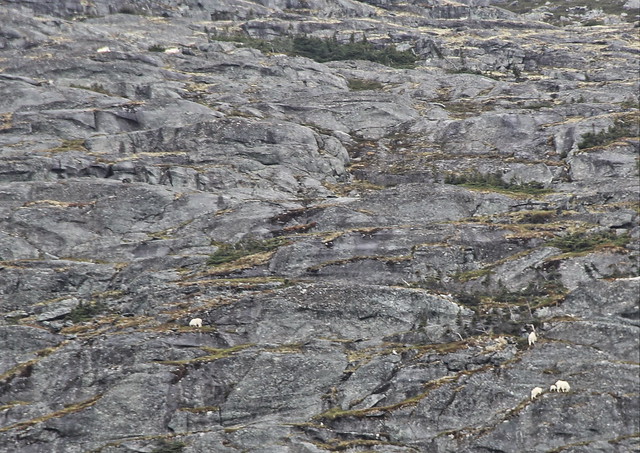
The skies cleared, and on our way down we could see our ship, looking like a white dot moored in the Skagway harbor.
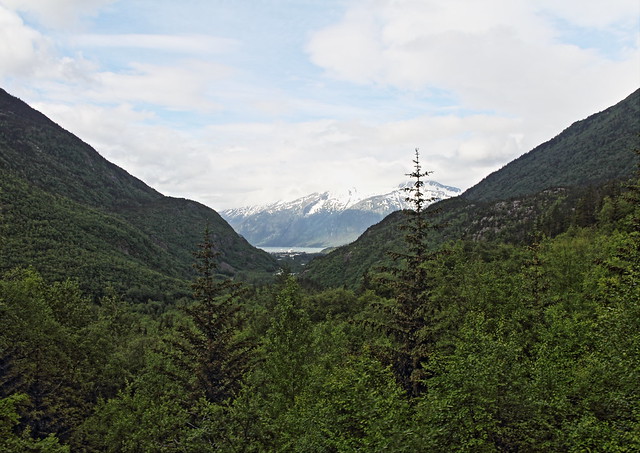
Next, on to see Hubbard Glacier and then to Seward, our port of debarkation.
Just as I was posting this, there was a news report that the train had derailed at the White Pass Summit on July 23. Two locomotives and four passenger cars left the tracks, and nine people were injured, none seriously.
http://o.canada.com/news/popular-tourist-train-derails-in-southeast-alaska-minor-injuries-of-9-people-reported
Linking to Skywatch Friday and Saturday's Critters
Visit these links to view the entire series of blogs on this Alaska trip:
Cruising to Ketchikan, Alaska
Cruising to Alaska's Icy Strait and Hoonah
Visiting Juneau and Skagway
Hubbard Glacier and Seward, Alaska
Denali National Park
Riding the rails from Denali to Anchorage
After departing from Ketchikan we continued up the Inside Passage with the Coast Mountains on the right (north and east) of our ship. These mountains divide Alaska from British Columbia. Some of its peaks rise above 10,000 feet, and the mountain continues into the ocean to form the Alexander Archipelago, a 300 mile chain of islands that shelter the Alaska coastline. Chicagof Island is the fifth largest island in the United States, and lies entirely within the Tongass National Forest.
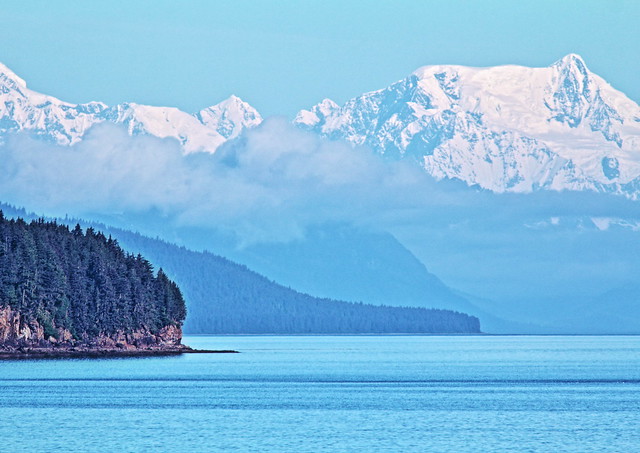
We sailed through Icy Strait under clear skies to reach the City of Hoonah (population 860 in 2000) in the northern part of Chicagof Island. Hoonah is populated by the indigenous Tlingit people, and its economy depends upon tourism, fishing and logging. As we approached the port of Hoonah we could see the evidence of clear-cutting of the virgin forest. Lowland areas selected for timber harvest include a disproportionate share of old growth, a density of about 12 times more per acre than normally found overall in Tongass National Forest. Logging roads fragment the wilderness and must later be maintained, at a cost to the US Forest Service of about $20,000 annually for each logging job that is created.
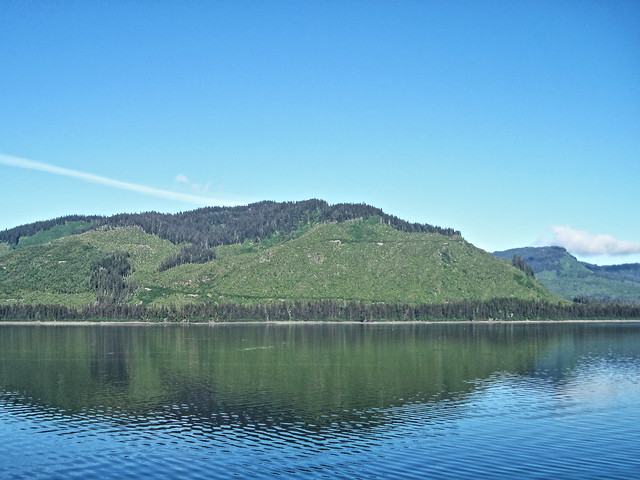
Our ship anchored offshore in deeper water as we rode in a tender to the dock.
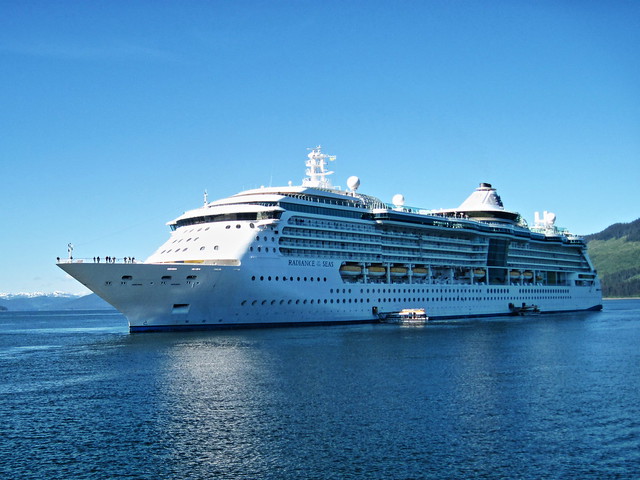
The Hoonah cannery stopped operating in the 1950s, and its buildings now serve as a spacious Visitor Center.
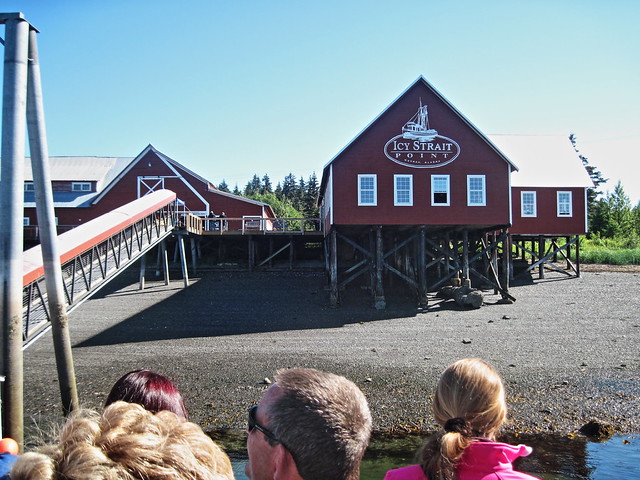
I processed my photo of this old fishing vessel as an oil painting, juxtaposed to the cruise ship in the background.
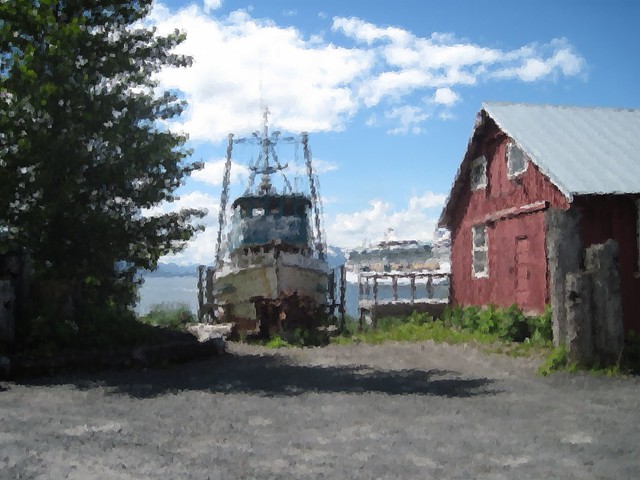
Many Bald Eagles roosted and flew in the port area.
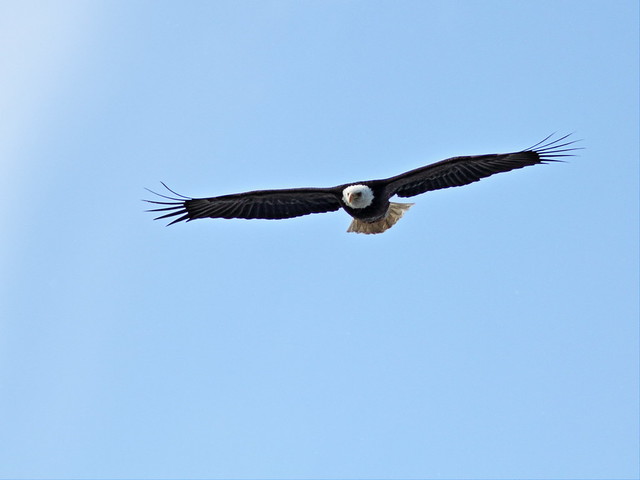
The majority of eagles were in their second and third years. Their heads and tails become fully white when they are 4-5 years old.

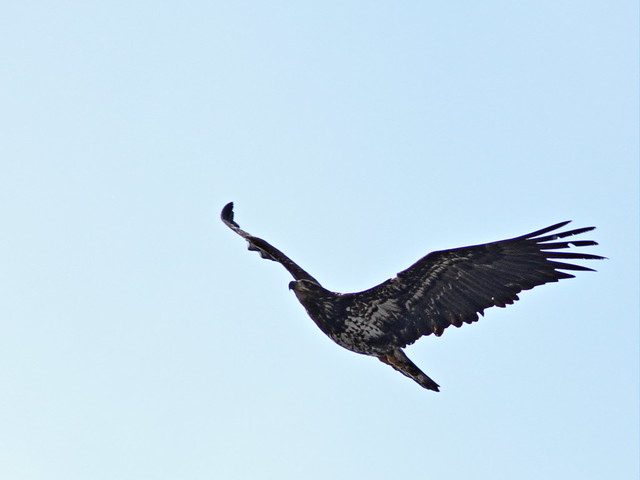
This bird is in adult plumage except for some dark tail feather tips.
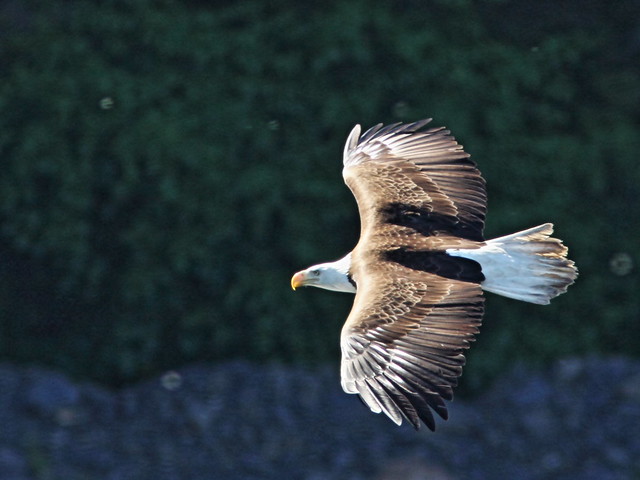
Although the salmon run had not yet begun, there was a bounty crop of herring, which the eagles devoured rapidly.
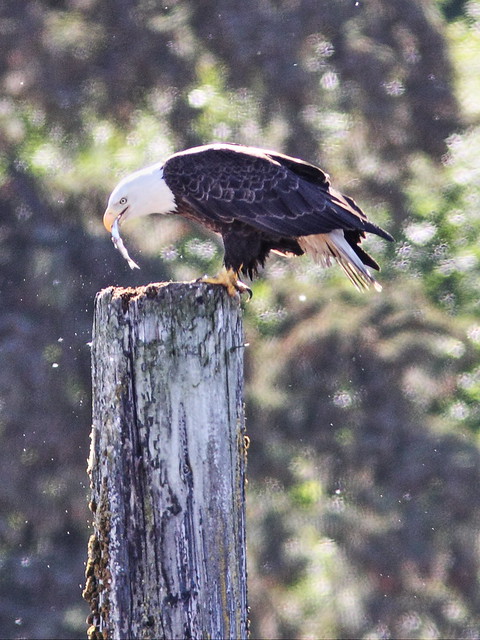
Our day started with a wildlife cruise, in search of whales, a very successful venture! Our granddaughters waved from the top deck of our catamaran as we pulled out to see wildlife.
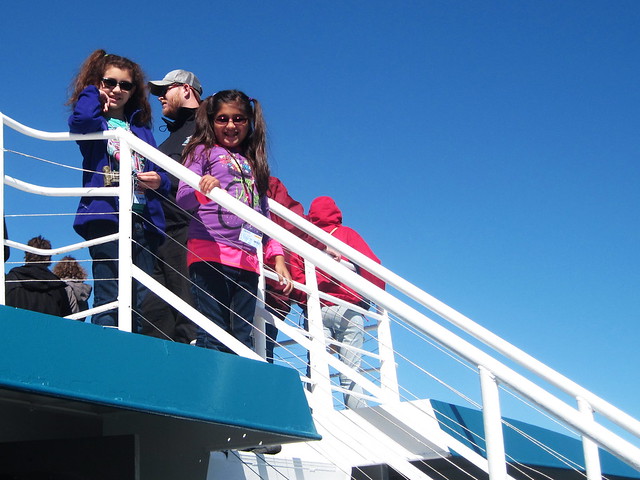
Whale sightings were guaranteed-- money back if none are sighted (no refunds have ever been granted). This Humpback Whale is "sounding," waving its tail good-bye as it dives deeply.
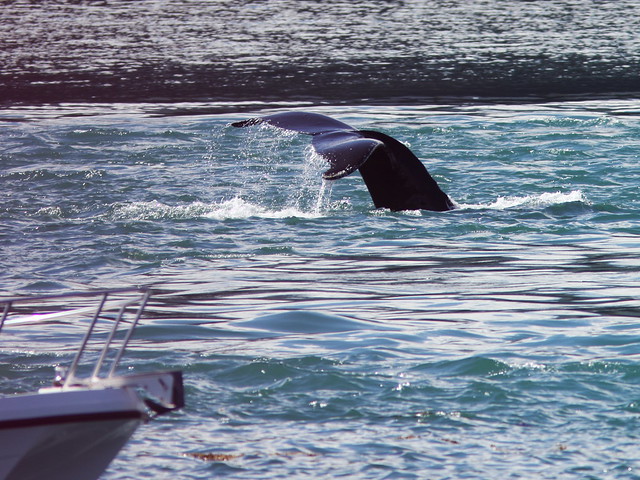
Individual whales may be identified by the pattern of pigmentation, barnacles and scars on their tails, like fingerprints. See: Identifying Individual Humpback Whales
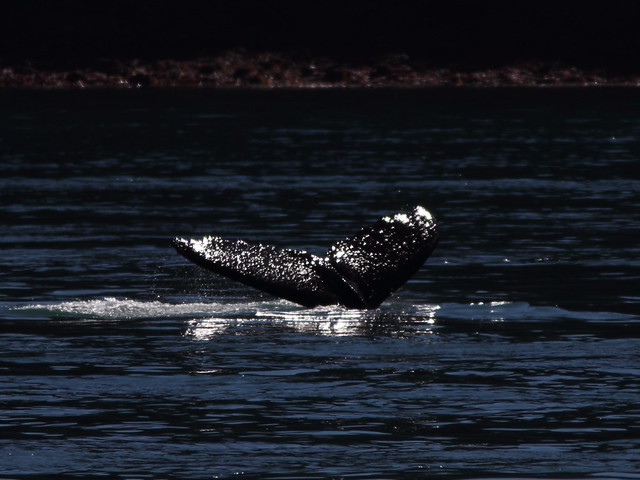
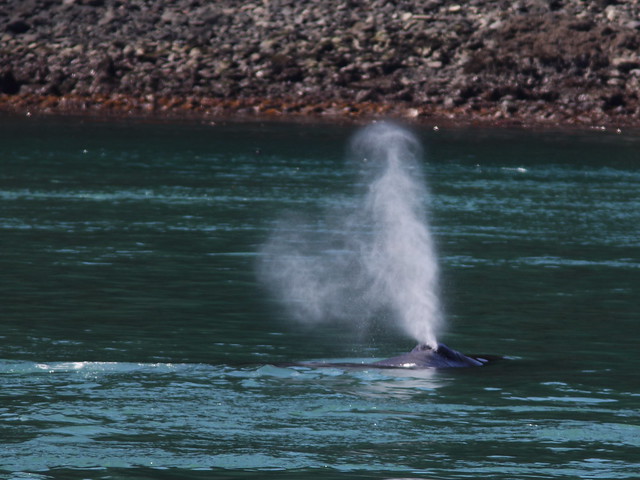
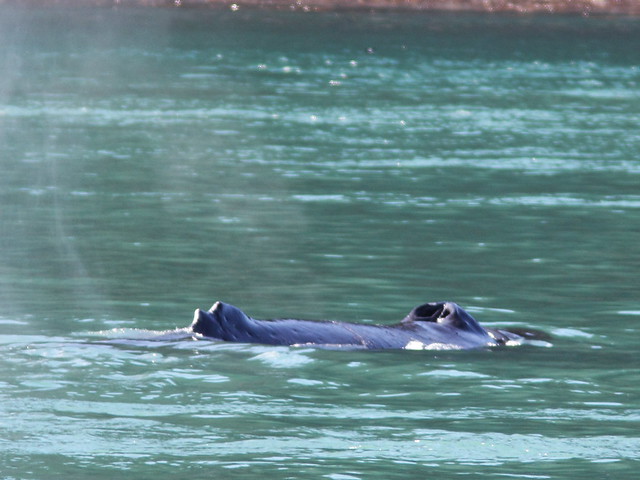
Of course, I had my eye out for birds. This gull is probably a Western x Glacous-winged Gull hybrid.
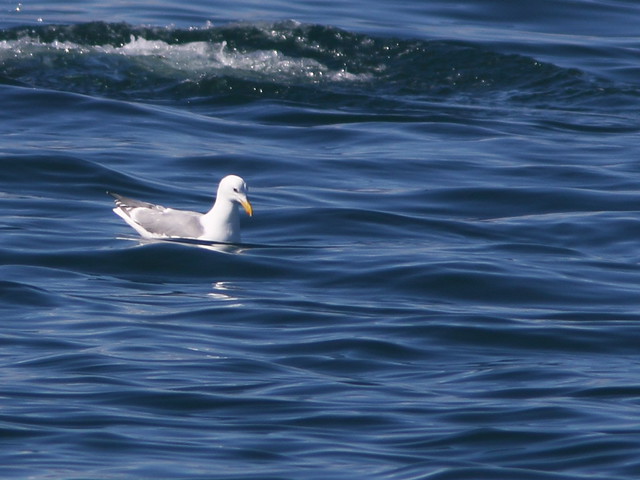
Common Murres were, well, common.
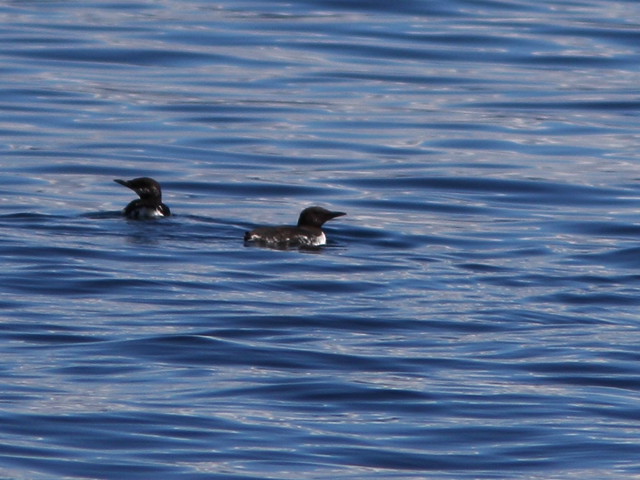
Following the cruise we took a bus into the forest in the northern reaches of Chicagof Island. As I related in an earlier post, I saw my first Red-breasted Sapsucker, the third "lifer" of the trip (the earlier were the Rhinoceros Auklet and Red-legged Kittiwake).
Soon after the sapsucker sighting, our daughter Jackie again proved her prowess as a wildlife spotter. As we walked across a wetland on the boardwalk she said she saw a very large yellowish tan bear very briefly up ahead of the group. No one else saw anything and I feared her credibility was at stake, so I kept a sharp eye out as we walked to a bluff that overlooked a wet grassy area. Sure enough, I spied movement about 1/4 mile away, and my telescopic lens view confirmed it was an adult Coastal Brown Bear, a "blond" sow known to our guide as also having a yearling cub.
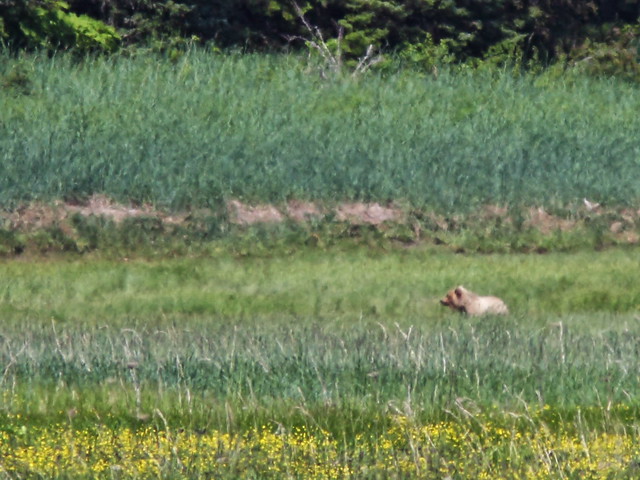
To our surprise, the cub, which weighs about half of its mother's 600 pounds, suddenly appeard out of the deep grass quite nearby, and waded across a small stream.
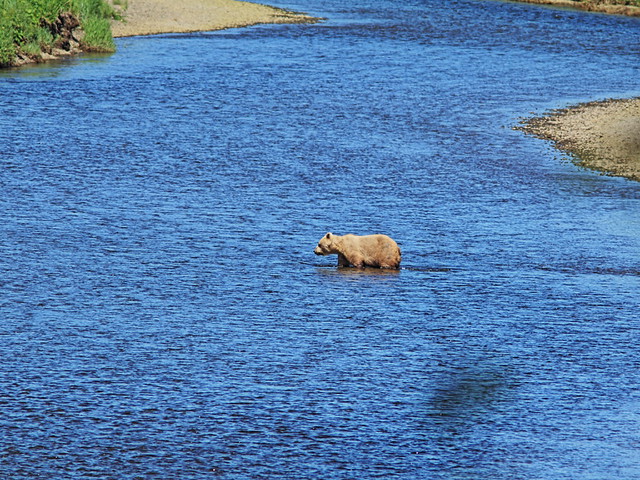
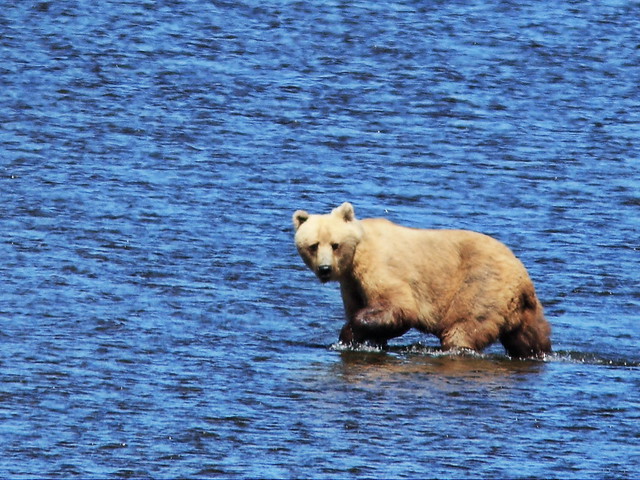
We had packed quite a bit into our short stay, and at 5:00 PM started steaming to our next port, Juneau.
Visit these links to view the entire series of blogs on this Alaska trip:
Cruising to Ketchikan, Alaska
Cruising to Alaska's Icy Strait and Hoonah
Visiting Juneau and Skagway
Hubbard Glacier and Seward, Alaska
Denali National Park
Riding the rails from Denali to Anchorage


























































